【商务英语】《商务英语报刊选读》--报刊简介共76页文档
- 格式:ppt
- 大小:11.86 MB
- 文档页数:76
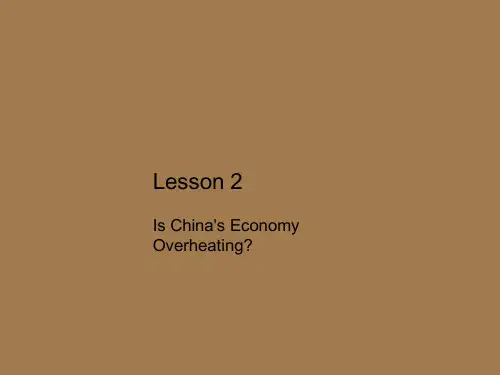

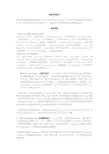
美英报刊简介美国和英国的日报总数约两千多家,各种期刊为五千余种,其中绝大多数是地方性和专业性报刊,全国性大报和杂志为数并不多。
下面介绍在美英国内若干有影响的报刊。
美国报纸American quality papers include:’The New York Times《纽约时报》The Washington Post 《华盛顿邮报》Los Angeles Times 《洛杉矶时报》USA Today 《今日美国报》The Wall Street Journal 《华尔街日报》The Christian Science Monitor 《基督教科学箴言报》International Herald Tribune 《国际先驱论坛报》Free Press 《自由新闻报》Chicago Sun-Times 《芝加哥太阳时报》New York Daily News 《纽约每日新闻》Boston Globe 《波士顿环球报》Dalas Morning News 《达拉斯晨报》San Francisco Chronicle 《旧金山纪事报》American news magazines:Time 《时代》周刊Newsweek 《新闻周刊》Reader’s Digest 《读者文摘》Fortune 《财福》杂志Business Week 商业周刊〉Far Eastern Review 《远东经济评论》U.S.News and World Report 《美国新闻与世界报道》Smithsonian 《史密斯森学会》杂志Star 《明星》Family Circle 《家族》月刊American Legion 《美国军团》People Weekly 《人民周刊》National Geographic 《国家地理》杂志1.The New York Times 《纽约时报》,1851年创刊。
属苏兹贝格(Sulzberger)家族所有。
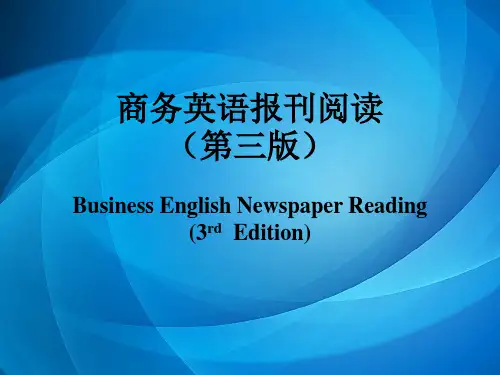
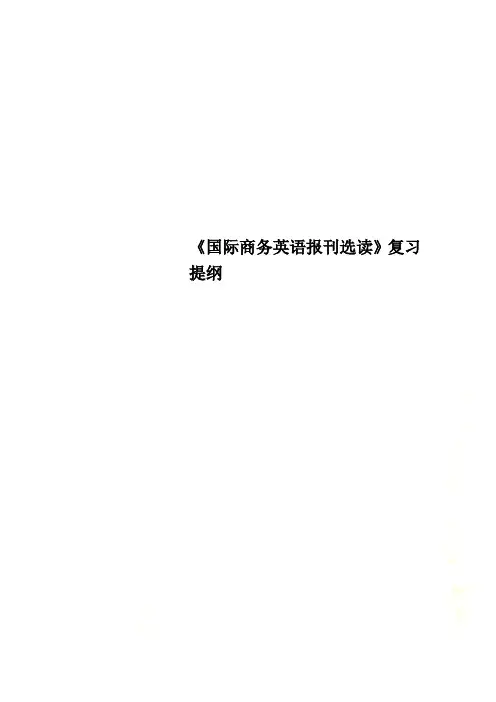
《国际商务英语报刊选读》复习提纲《国际商务英语报刊选读》复习提纲一、词汇词组(英翻中)job title 职别personnel manager 人事主管packaging 包装marketing director销售主管publicity controller 宣传主管managing director 常务董事layout 布局,安排,版面设计house style 印刷风格,独特风格,排字风格letterhead 信头logo 专用标记,标记,商标records for the files 文件记录trade exhibition 商品交易展览会company stand 公司展位delivery date 交货日期printed matter 印刷品relative merits 优缺点head office 总公司board 董事会health and safety provisions 健康与安全规定Bill of Lading 提货单Sea Waybill 海运单Air Waybill 空运单Shipping Note / Shipment Advice 装船通知单Dangerous Goods Note 危险物品通知单Certificate of Insurance 保险证明order book 订货簿shipping date 船期,装船日期money-back warranty 退款保证Samples of Merchandise 货物样品public relation 公共关系in good shape 完整无损,处于良好状态,健康情况良好sole supplier 唯一供给者tradejournal 行业杂志yellow page 电话黄页confirmed irrevocable letter of credit 不可撤销的保兑的信用证import license 进口许可证special introductory price 新产品特价bill of exchange 汇票house bills 公司汇票inventory position (BR. stock position)库存水平interest charges 利息费用bad debt 呆账(收不回的账)debt collection agency 债务托收代理trade & bank reference 银行征信(银行提供有关商号信誉等情况)pay-back date 付费日期business card 名片二、请根据给出的汉语词义写出对应的英语词。
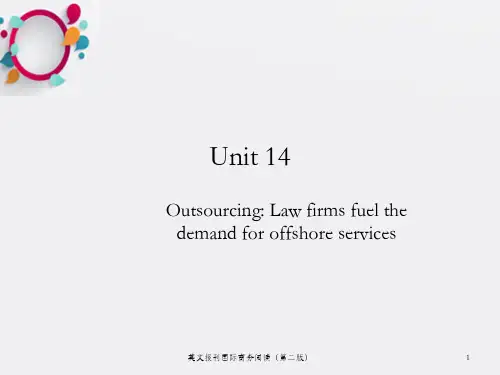
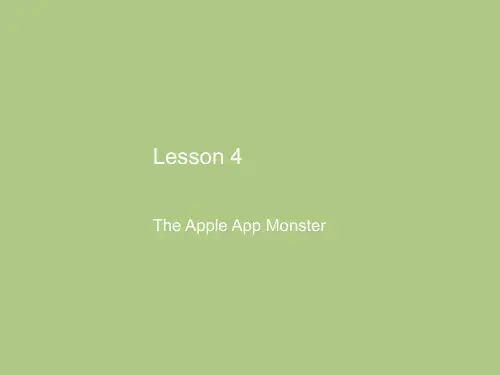
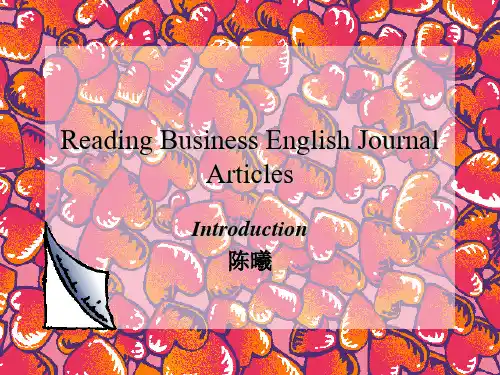

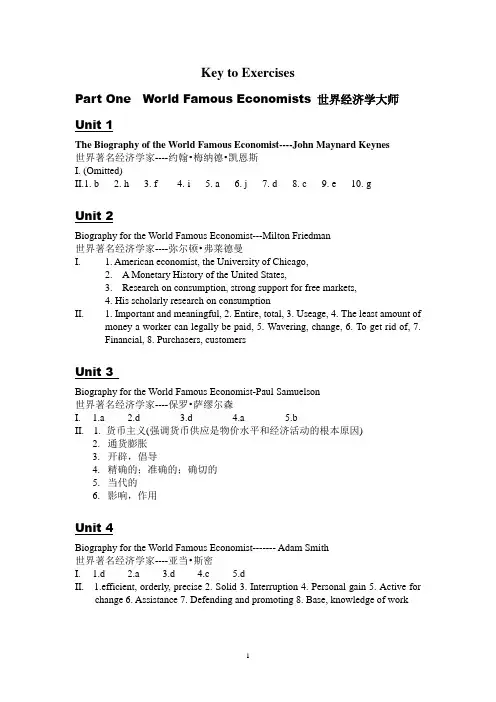
Key to ExercisesPart One World Famous Economists世界经济学大师Unit 1The Biography of the W orld Famous Economist----John Maynard Keynes世界著名经济学家----约翰•梅纳德•凯恩斯I. (Omitted)II.1. b 2. h 3. f 4. i 5. a 6. j 7. d 8. c 9. e 10. gUnit 2Biography for the World Famous Economist---Milton Friedman世界著名经济学家----弥尔顿•弗莱德曼I. 1. American economist, the University of Chicago,2. A Monetary History of the United States,3. Research on consumption, strong support for free markets,4. His scholarly research on consumptionII. 1. Important and meaningful, 2. Entire, total, 3. Useage, 4. The least amount of money a worker can legally be paid, 5. Wavering, change, 6. To get rid of, 7.Financial, 8. Purchasers, customersUnit 3Biography for the World Famous Economist-Paul Samuelson世界著名经济学家----保罗•萨缪尔森I. 1.a 2.d 3.d 4.a 5.bII. 1. 货币主义(强调货币供应是物价水平和经济活动的根本原因)2.通货膨胀3.开辟,倡导4.精确的;准确的;确切的5.当代的6.影响,作用Unit 4Biography for the World Famous Economist------- Adam Smith世界著名经济学家----亚当•斯密I. 1.d 2.a 3.d 4.c 5.dII. 1.efficient, orderly, precise 2. Solid 3. Interruption 4. Personal gain 5. Active for change 6. Assistance 7. Defending and promoting 8. Base, knowledge of workUnit 5Biography for the World Famous Economist--------- Karl Marx世界著名经济学家----卡尔•马克思I. 1.c 2.d 3.c 4.c 5.dII. 1. Revolutionary 2. To drive out 3. To try to make it through 4. All the time5. To take advantage of6. To destroy7. A speech in praise of someonePart Two Business Communication商务沟通Unit 6Elements of Communication沟通的要素Ⅰ. 1. Source in the text is a communicator who is initiating action.2. The following should be taken into consideration in defining audience:a. What will make them support you?b. Is their attitude toward your proposal positive, neutral, or negative?c. How are they likely to perceive you?d. Are there hidden audiences you haven’t considered?3. There are 7 categories in any business communication situation: the source,audience, goal, context, message, media, and feedback.4. First of all, we should consider what message will achieve our goal with theaudience. We should then have an idea about how much information they need, what doubts they’re likely to have, how our proposal will benefit them and how to make our message convincing and memorable.5. We could convey our message to each audience by either speaking, writing,calling, sending E-mail, sending a memo, meeting, faxing, producing a videotape, or hold a press conference.6. We should seek our audience’s understanding at every stage of thecommunication and give them an opportunity to respond. Communication is not an act, but a process. Our message provokes a response, which requires another message from our audience. In this way we know what they think and can modify our message accordingly.II. 1. b 2. d 3. i 4. g 5. e 6. j 7. f 8. a 9. c 10. hUnit 7Who Are Y ou as a Communicator 作为沟通者的角色I. 1. Aristotle spoke directly in his book “Rhetoric”, three essential qualities ofsuccessful communication. They are: logos, pathos, and ethos.2. Pathos plays a major role in every interaction in a business setting. For example,we are more likely to help out a colleague we like; we work harder for a boss who we feel respects and counts on us and we’ll probably promote a competentfriend instead of a talented competitor whom we vaguely distrust.3. They are always making judgments about whether their leaders are decent people,worthy of support and respect and whether their leaders are working for a larger purpose than their own short-term interest.4. Without an understanding of human nature which can come only from a broadbase of knowledge and experience, the manager will get nowhere no matter how well they have commanded communication theory or public relations tricks. This important point has been proved by current experience in teaching and practicing business communication.5. These interests not only give business people something to talk about at the nextoffice party, but they also help you grow as a whole person. The ability to engage in informed conversation about someone else’s interests can establish rapport and increases willingness to grant you credibility on your own turf.6. I think the author will discuss the qualities of effective communication in detailnext because he mentions in the end that “Good communicators are good listeners”, and as we all know to be a good listener is one of the qualities of an effective communicator.II. 1. h 2. a 3.e 4. b 5. i 6. c 7. g 8. d 9. 7 10. fUnit 8Business Internet商务互联网I. T F F F TII. at out in, to to, afford profitable with to, of Through search, on-line for, toUnit 9Know the Big Four Communication Initiatives四大策略实现沟通无极限I. 1. Problems: it has a terrific concept, but doesn't know how to articulate itconcisely./has difficulty sharing that excitement with key audiences.Solution: find the benefits and differentiators and consolidate them into three key messages that clearly explain the company's goals and offerings.2. This news release will also become an inexpensive piece of marketing collateralto distribute to key customer and investor targets.3. It is critical for a company to establish a reputation.Content: a list of key characteristics, accomplishments, financials and personnel.4. well-prepared: provide significant benefit to the company with each interview.ill-prepared: cause major damage to a company's sales and marketing efforts.II. 1. g 2. e 3. j 4. f 5. h 6. d 7. b 8. a 9. c 10. iUnit 10E-Newsletters: The Hottest New Marketing Tool电子业务通讯――炙手可热的营销工具I. 1. b 2. c 3. d 4. a 5. c 6. dII. 1. combine 2. consistent 3. subscribed 4. offered 5. regardless of6.reference7. permission8. retains9. charge 10. options 11. favorable12. efficiencyPart Three Business Culture 商务文化Unit 11Business and Culture 企业与文化I. 1. F (The success of your company abroad will depend on both the employee’ssensitivity and responsiveness to a new cultural environment and his ownjob-related expertise.)2. F (It’s not usually equally the case. The success depends on how effectivelyhe/she can exercise his/her skills in a new cultural environment.)3. T4. T5. T6. T7. F (Everyone has a culture, regardless of where they were born, raised, educated,and civilized. People are with cultures of their own--- interesting, diverse, richand different from each other. )8. T9. F (Culture can and does have an enormous influence on human biology. Themost striking example can be seen in that men in their third decade of life now weigh substantially more than their grandfathers did and are, on average, several inches taller.)10. TII. 1. h 2. f 3. e. 4. g 5. c 6. b 7.d 8. a 9. j 10. iUnit 12Recognize Cultural Differences 认识文化差异I. 1. It’s because most of the time our business partner encode their message using theassumptions of their own culture whereas we often decode their messageaccording to the assumptions of our culture.//We can avoid such kind ofmisunderstanding by improving intercultural sensitivity and recognizing andaccommodating cultural differences.2. Culture context is the pattern of physical cues, environmental stimuli, andimplicit understanding that convey meaning between two members of the same culture.3. When communicating across cultures, you can keep your messages ethical byapplying the following four basic principles: a) Actively seek mutual ground. b) Send and receive messages without judgment. Both parties must trust one another. c) Send messages that are honest. d) Show respect for cultural differences.4. Executives from Latin America and Asia see time as more flexible. They believemeeting a deadline is less important than building a business relationship.5. Because the simplest hand gestures change meaning from culture to culture.Don’t assume that someone from another culture who speaks your language has mastered your culture’s body language.6. Recognizing cultural differences helps us avoid sending inappropriate signalsand correctly interpret the signals from others. It’s an important step toward improving intercultural sensitivity.// No. Being aware of cultural differences is only the first step in improving our intercultural communication. We need to balance cultural awareness with cultural flexibility. To communicate across cultures successfully we must be able to accommodate these differences without judging them and without the human tendency toward ethnocentrism.II. 1. f 2. h. 3. i 4. b 5. c 6.j 7. g 8. a 9. e 10. dUnit 13Avoiding Culturally Related Business Blunders 中美商业文化差异一瞥I. 1. If we don’t understand cultural differences we won’t be able to succeed ininternational business and to be good citizens of the international community.Therefore we should not only learn to honor and respect our own cultures butalso to develop an appreciation, tolerance, and respect for others’ cultures.2. It is very important to create an environment of mutual understanding andrespect through our attitude and actions. Thus our blunders are usually met with understanding and forgiveness. To show some knowledge of local culture willalso help to establish a positive mood as negotiations begin.3. Status. For example people in the United States show respect by addressing topmanagers as “Mr. Billings”or “Mrs. Heinrichs”. However status is very important in China. In addressing businesspeople, the official title of each person should be used, such as Chairman, President, or Manager. If a Chinese thinks that he or she is not respected, most likely, negotiations will not be successful.Chinese “Y es”versus American “Y es”. For example, if an American business person wants to make an appointment with an associate, he/she will call the individual, and they will agree on a date and time for the meeting. If a conflict should arise and the person is unable to keep the appointment, then he/she will call and make other arrangements. All is understood when an American says “yes.”In the same situation, saying “yes.”doesn’t mean that a Chinese will meet at the agreed time and place. The Chinese is saying “yes.”, he/she likes and respects you and, therefore, wants to please you. If you understand this you will know that he/she may or may not be at the meeting. If he/she is not, youwill not be offended but will continue in your efforts to meet with him/her until you establish a time when he/she is free to do so. Then, you can conduct the business that is important to both of you.4. American desire for agreement on specific terms while Chinese tend to agreefirst on general principles. American is interested in short-term goals while Chinese in interested in long-term goals.5. Y es, there is. American lack patience and has a great interest in profits whileChinese make great efforts to establish an everlasting business relationship and focus on the future potential business dealings.II. 1.e 2.j 3.i 4.g 5.c 6.a 7.d 8.b 9.f 10.hUnit 14Negotiating with People from Different Backgrounds如何与来自不同文化背景的人谈判I. 1. T2. F (the size of their entourage)3. F (Y ou don’t ask directly but just to express your wish to the organizer. )4. F (between Japanese business people)5. F (It is.)6. F (It’s fine for people of all ages.)7. F (Australia)8. T9. F (French )10. TII. 1. f 2. g 3.i 4.e 5.b 6.a 7.j 8.c 9.d 10.h Unit 15Tough Negotiator Takes Control 谈判强手占上风Ⅰ. 1. This relatively short time was sufficient to establish his authority and position as a busy man and to put the other party on edge with impatience.2. Dr. Park made psychological use of the venue of the meeting. Anyone, ofcourse, is more comfortable on his home turf. Expert negotiators advise thatyou insist on meeting at your office, or at least upon alternating meetinglocations.3. Dr Park established himself as the authoritative figure in the room.4. Because he wanted to show an attitude of calm, unhurried confidence.5. a. Notified the other party that most of our desires were not merely unacceptable,but impossible.b. Obliged the other party to negotiate preliminary with a clerk in a differentdepartment before completing the discussion with him.c. Made time his ally by refusing to see the other party for more than two or threehours during the week, after they had expended enormous time and money tomeet in a place convenient for him.d. Disciplined his negotiating team to do nothing not expressly requested andguided by him.II. 1.e 2.h 3.g 4.f 5.a 6.i 7.j 8.b 9.d 10. cUnit 16A Better Way to Bargain 教你谈判高招I. 1. F 2. T 3. T 4. T 5. T 6. F 7. T 8. FII. 1. negotiating 2. concession 3. absolute 4. established 5. alternative 6. revealed 7.complex 8. commerce 9. loan 10. certifying 11. approved 12. proposalPart Four Business Management 企业管理Unit 17Business and Social Responsibility 企业与社会责任感Ⅰ. 1. b 2. d 3. c 4. d 5. a 6. bⅡ. 1. benefit 2. legal 3. improving 4. implemented 5. fair 6. shunned7. patronize 8. rewarded 9. monitor 10. boycott 11. pressure 12.charitiesUnit 18Forms of Business Ownership 企业所有制形式Ⅰ. 1. three; a sole proprietorship, a partnership and the corporation structures2. everything; opinion3. share4. expertise5. state, separated6. run; theboard of directors; 7. capital, profits 8. risk; createⅡ. 1. c 2. e 3. a 4. k 5. d 6. f 7. h 8. b 9. g 10. i 11. l 12. jUnit 19Doing Good Means Doing Well, Too有益于社会便有利于公司Ⅰ.1. T2. T3. F (you don’t have to do.)4. F (A little something youdo with heart and sincerity may go a long long way.)5. TⅡ. 1. initiative 2. entities 3. Shareholders 4. profitable 5. abide by6. ethical7. discretionary8. clear-cut9. image 10. ad hocUnit 20CEPA --- A Special Arrangement Abiding by International PracticesCEPA---一个遵循国际惯例的特殊安排I. 1. 273 types of products.2. On January 1, 2004.3. With CEPA, 90% of Hong Kong domestic exports to the Mainland can enjoyzero tariffs. Also, CEPA opens up 18 service industries to Hong Kong companies. More important, CEPA provides long-term opportunities for Hong Kong people to establish business or work on the Mainland.4. The high IP value industries are knowledge-based and would not be massive inscale.5. To take the advantage of its intellectual property rights protection, free tradeand investment environment and reputation in cosmopolitan design.Ⅱ. 1. capitalized on 2. interlock 3. liberalization 4. emerged 5. penetration6.high-end7. proprietary8. distribution9. Accessories 10.cosmopolitanTransportation 运输Ⅰ. F T T T TII. for to up, as in around besides, in on, from, to aboard away, from on, ofPublic Relations 公共关系Ⅰ. 1. c 2. d 3. a 4. c 5. b 6. bⅡ. 1. vacuum 2. taxed 3. trust 4. cooperated 5. vigilant 6. giant7. campaign 8. proceed 9. committed 10. reputation 11. Evaluation12. valued 13. instructed 14. principle 15. recycle16. protect 17. radius 18. charitablePart Five Leadership 领导艺术Unit 23The Job of a Manager 管理者的工作Ⅰ1.d 2.b 3.d 4.b 5.c 6.dⅡ1.precisely 2.score 3.interpret 4.objective 5.striving 6.assigned7.delegated 8.motivation 9.promoted 10.ranging 11.convinced12.developUnit 24Leadership 领导的艺术Ⅰ. 1. d 2. a 3.b 4.d 5.a 6.dⅡ.1.emerges 2.swift 3.dimension 4.predominate ply with 6.heed7.depends 8.according to 9.involving 10. participate in 11.specific12.by contrastUnit 25Depression in the W orkplace is Costly 工作场所精神不振,代价高昂I. 1.c 2. a 3. d 4. c 5. d 6. dII. 1. suffer 2. bewilder 3. approach 4. productivity 5. alike 6. competent 7. claim8. various 9. available 10. induced 11. flexible 12. ResourceUnit 26Emotional Intelligence Becoming Key in Today's W orkplace情商开始在工作中崭露头角I. 1. F 2. T 3. T 4. T 5. F 6. T 7. F 8. F 9. T 10. TII. 1. differentiate 2. subordinates 3. specialize 4. aware 5. viewed 6.excelled 7. behavior 8. valuable 9. intuitive 10. empower 11.assessments 12. negative 13. counting 14. professional 15. strength 16.facilitiesUnit 27Keeping Employees Interested in Y our Message 如何让员工关心公司I. 1. T 2. F 3. T 4. T 5. T 6. F 7. T 8. TII. 1. conference 2. coordinated 3. perceive 4. commit 5. issue 6.appreciated7. involved 8. encompass 9. due 10. response 11. scheme 12. Overall Part Six Finance 金融业务Unit 28Foreign Exchange 外汇I . 1. The major problem associated with international trade is the problem of whichcurrency to use in international commerce.2. If a trader makes a deal that is going to be paid in a foreign currency,the traderwill receive less value for the goods than he originally thought; extra profit could be made if the foreign currency increases in value.3. One way is to include the estimated cost of the currency change into the dealto protect against potential loss. Banks may also be willing to assume the risk of currency fluctuations with foreign currency letters of credit.4. A hedge is a contract that provides protection against the risk of loss fromcurrency fluctuations.5. Forward market hedge, money market hedge and options marketII. 1. money in a foreign currency.2. a person who buys something.3. the right to sell a friend quantity of a commodity, currency or security at acertain price and on a certain date.4. a person or an organization that earns money by buying goods and selling themat a profit.5.to buy a commodity, share or invest otherwise at a fixed price for futuredelivery to protect oneself against loss caused by a possible change in price.6.the right to buy a fixed quantity of a commodity, currency or security at acertain price and on a certain date.7. a person or an organization that sells.8.the rising and falling or changing of prices.9. a foreign currency rate is locked by buying a forward contract at the time thetrade agreement is made.10. market for short-term debt instruments, a practice of investing at a fixed pricefor future delivery to protect oneself against loss caused by a possible change in price.11. unit of money in the Federal Republic of Germany.Unit 29What is Foreign Exchange 什么是外汇Ⅰ. 1. The day that sees the arrival of single world currency will also witness the disappearance of foreign exchange business.2. The foreign exchange dealers trade foreign exchange (foreign currency only)between banks.3. A currency, whether in foreign exchange or bank notes, is usually calledconvertible if the person holding it can convert it freely into another currency.4. It’s because of the exchange regulations of the United Kingdom. It recognizedonly external, or non-resident, convertibility. Until 1979, this was still the case with the United Kingdom.5. World trade and the cross-border money and capital movements resulting formfinancial transactions are the basis of foreign exchange dealings. The observation of the French economist Gaétan Pirou shows that foreign exchange deals spring from “the coexistence between the internationalism of trade and nationalism of currencies”, thus aptly describes at least the original motive of this “métier”.Ⅱ. 1. 所有可以在国外支付的以外国货币表示的债权2. 外币汇票或支票3. 外汇4. 外汇管制规定5. 有明显的区别6. 可兑换性7. 经常项目(货物和服务)交易8. 纯粹金融性交易9. 受到一定程度的限制10. 完全可兑换Unit 30Double-edged Sword of RMB Exchange Rate Stability人民币汇率稳定性的利弊I. 1.D 2. A 3. D 4. C 5.D 6 BII. 1. mechanism 2. value-added 3. rosy 4. hampered 5. aggravating6. innovation7. Tertiary industries8. manufacture9. technologicalcontent 10. is capable of 11. fillipUnit 31RMB Gets Wider Use across Region 人民币正健步走向海外I. 1. The biggest Chinese holiday season comes.2.Overseas travels by Chinese and their spending.3.Through tourist spending and border trade.4.No.5.omitted.6.Because of the huge amount of tourism spending that Hong Kong can receivefrom the mainland.7.In Laos and Mongolia.8-10. omitted.3. h4. j5. i6.b7. e8. d9. a 10. cTips to Ensure Protection of Credit Cards 安全使用信用卡提示I. 1. There is a recent credit card data breach in the United States.2. It is in its starting period.3.The breach may have allowed hackers access to 40 million credit card accounts.4.Visa, MasterCard, American Express and Discover accounts.5.Just in case that through an honest mistake, that a store should add an extra zeroto a transaction.II. 1. marginal 2. in the wake of 3. breaches 4. fraud 5. hacking 6. debit7. liability 8. unsolicited 9. transaction 10. vendorUnit 33Buy and Build Decision收购与创建决策I . 1. It’s mainly about the reasons for buying and building a company in FDI2.The large privatization programs.3.It avoids the problems caused by start-up; it’s easy to finance; it will notincrease the market capacity.4.The difficulty of transferring resource to a foreign operation or acquiring thatresource locally for a new facility;5.Personnel. Because the local labor market may be tight.6.Acquisituon enables it to avoid the risk of depressed prices and lower unit salesper producer7.Because foreign investments frequently are made where there is little or nocompetition.8.Because they fear lessening competition or market dominance by foreignenterprises.9.Personnel and labor relations may be poor and difficult to change, ill will ratherthan good will may have accrued to existing brands, or facilities may beinefficient and poorly located in relation to future potential markets.3. j,4. b,5. h,6. g,7. i,8. f,9. d, 10. eCommon Stock and Preferred Stock 普通股与优先股Ⅰ. 1. d 2. c 3. c 4. c 5. a 6. bⅡ. 1. issued 2. Charter 3. spell out 4. entitled 5. merges 6. dissidents7. bring in 8. guarantee 9. distributed 10. reinvested 11. speculate12. security 13. preferential 14. liquidate 15. cumulative16. claim 17. declared 18. privilegesUnit 35Markets Hit New High; Steel Stocks Shudder 市场再创新高,钢铁股票紧缩I. 1.A 2.D 3. A 4. B 5.D 6. BII. 1. fell against 2. rise 3. red 4. solid 5. blue-chip 6 validation7. gloomy 8. sagged 9. tumbled 10. consecutive 11. flat 12. S&P Unit 36Income tax unification postponed? 推迟所得税的统一?I. 1. A 2. A 3. B 4. C 5. D 6. DII. 1 submit 2.implement 3.unified 4. confirm 5.guarantee 6.reform7 identify 8.domestic 9.ask for 10.draft 11.impact 12.calls forHow Insurance W orks 保险的作用Ⅰ. 1. a 2. c 3. d 4. b 5. a 6. dⅡ. 1. premium 2. peril 3. coverage 4. pertinent 5. assume 6. damages7. incurred 8. converted 9. generate 10. income 11. invest12. run the risk of 13. speculative 14. potential 15. purchasing16. adverse 17. unaffordable 18. reimbursementPart Seven Marketing 市场营销Unit 38The Marketing Concept 营销概念Ⅰ. 1.d 2.c 3.b 4.c 5.a 6.a 7.d 8.dⅡ. 1.marketing 2.concepts 3.vital 4.facilitate 5.coordinating 6.altering7.pace 8.expedite 9.balance 10.integrate 11.systematic 12.respective13.characteristic 14.quality-oriented 15.specifies 16.adoptUnit 39Franchising 特许专营Ⅰ.Ⅱ.7. inhibit 8. associated 9. prefer 10. provideUnit 40Personal Selling 个人推销Ⅰ. 1. b 2. d 3. a 4. c 5. d 6. bⅡ. 1. flexible 2. triggered 3. prospect 4. generate 5. facilitate 6. rapport7. canvassing 8. remind 9. stimulate 10. execute 11. demonstrated12. ongoing 13. objections 14. competes 15. orderUnit 41Advertising 广告Ⅰ. 1.b 2.d 3.c 4.d 5.a 6.bⅡ.1. advertising 2.Spiraling 3.cynical 4.fragmented 5.dispose 6.sophisticated 7.tangible 8.mirror 9.derives 10.orient 11.allocate 12.distribution 13. retail 14.advisable 15.attitudeUnit 42He’s the Master of His Domain Name 他是域名的主人I. 1. T2. F (His real home is the virtual world of the Net.)3. T4. F(The demand for .com names is great.)5. F (Eric Lyons is his business partner.)6. F (for $100 two years)7.T8. F (The operation cost nothing to run.)9. T10.TII. 1. b 2.d 3. f 4. h 5.c 6.i 7.a 8.j 9. g 10.eUnit 43Foreign Franchises Advancing into China外国特许经销商向中国进军Ⅰ.1. b 2. a 3.d 4.c 5.a 6.cⅡ. 1. World Trade Organization (WTO)2. franchiser3. trial regulation4. chain store5. convenience store6. franchisee7. profit8. brand recognition9. fake brand10. Ministry of CommercePart Eight Economy and Problems 经济与问题Opportunity Costs and Marginal Costs 机会成本与边际成本I. F F T F T F T F F FII. societies around limit services produced resources production military sell walkUnit 45The Characteristics of Monopoly垄断的特征I. T T F T F T T T T TII. recognized response profitable competition monopoly serve prices turn reasonable possessUnit 46The Characteristics of Oligopoly寡头垄断的特征I. T F T F F T T F T TII. characterizes gain choice shares preserve increases runs benefit tendency alterUnit 47What Is Full Employment? 什么是充分就业?I. T F F T F T T T F TII. unemployment disagreement reduce labor rate policies higher threatens compete fullUnit 48Demand-Pull Inflation and Cost-Push Inflation需求拉动型通货膨胀与成本推动型通货膨胀I. T F F T F T F T T TII. demand increase power production satisfy output productivity wage profits triggerUnit 49European Economic Community欧洲经济共同体I. F T F T FⅡ. D D C B C A A C C BUnit 50Barriers to International Trade国际贸易壁垒I. F T F T FII. in to out on on,on,by On,to on,on between,from Under from,inUnit 51Technology Transfer 技术转让Ⅰ. T F T F FⅡ. to/toward over,with,with on/upon,over in,to of,for,to on/upon on,with with,to in,to Despite,asUnit 52The Profit Squeeze 油价上升,收益减少I. 1. The higher costs and the crimped consumer demand.2. Each US$10 increase clips worldwide economic growth by half a percentagepoint.3. It was 5.1 per cent.4. The fuel prices deterred buyers.5. Higher oil prices and lower consumer demandII. 1. crimped 2. squeeze 3. margins 4. futures 5. clipping6. inventory7. bite8. reining in9. consecutive 10. deterringUnit 53“Green Route” the Only Road for Business走绿色经济发展道路Ⅰ. 1. T2. F (seven times that of Japan and six times that of the United States )3. F (3 million square kilometers.)4. F (by developed countries)5. TⅡ. 1.habitable 2. hailed 3. barriers 4. imposed5. environmentally-friendly6. circular economy7. sustainable8. takes no account of 9. deductions 10. vowedUnit 54Self Promotion努力打造中国品牌Ⅰ.1. F (The label means no more than an origin, because most of the commodities bear a foreign brand name.)2. T3. F (20 per cent)4. T5. TⅡ. 1. labels 2. resorted to 3. cost-tailoring 4. guarantees 5. friction6. patent7. limit the dumping8. footwear9. outlets 10. clinched11. launchUnit 55China Strives to Meet WTO Challenges 中国迎战WTOI. 1. D. 2.D 3.B 4. A 5. C 6. D 7. BII. 1. conform 2. abolished 3. arduous 4. eliminate5. enterprises6. regulation7. compensation8. revisedUnit 56France Likely to Breach EU Budget Deficit Limits法国可能违背欧盟赤字预算限定I. 1. A 2.A 3. B 4. B 5. D 6. CII. 1. pledged 2. budget 3. takes her for granted 4. suspended 5. stripped6. deficit7. disciplined8. consolidated9. halt 10. utilize11. conservative 12. banking onUnit 57Software Developer or Customer: Who Owns the Rights所有权属谁, 软件开发商还是客户?I. 1. the ownership of intellectual property rights for the software.2.the relative power of the parties, the extent of new code, and the importance ofthe software to the customer's competitive position within its industry and the cost.3.the author of the software (the developer) owns the copyright in the source codeand the customer's use is under license from the developer.4.secure copyright ownership of any of the code.5.the loss of the competitive advantage; the subsidy of the second distributor'spurchase of a similar system.6.accumulated knowledge.7. a developer give customers ownership of the entire software code.8.expertise, reputation.II. 1. h 2. g 3. a 4. f 5. j 6.b 7. i 8. e 9. c 10. dUnit 58Coal Supply Shortage still Looming in China 中国燃煤供给不足仍令人担忧Ⅰ. 1. It may, at least in the short run, result in a damper on China’s economic growth.2. The purpose of drawing up a comprehensive plan is to level off the sharpswings in supply and demand of energy so as to ensure steady, long-term economic development.3. It cracked down on small, inefficient mines.4. They may have to shut down when they run out of coal.5. It plans the national economy, and it is the top economic planner.6. The first priority for the NDRC for the present is to ease the tightened coalsupply.7. The coal prices in China will probably go up.。

商务英语报刊选读答案【篇一:英语资料分享】1、虚拟语气的考点为:would rather+that从句+一般过去时;it is vital/ necessary/ important/ urgent/ imperative/desirable/ advisable/ natural/ essential+that+(should)动词原形; proposal/suggestion+that+动词原形;it is time/about time/high time+that+一般过去时;lest+that+should+动词原形;if only+that+would+动词原形。
2、状语从句的考点为:非if引导的条件状语从句,此类句子多用at times,provided,so long as,in case,once等来替代if;由even if/so,now that,for all等引导的让步状语从句;just/hardly...when引导的时间状语从句;more than,as...as,not so much as,the same as,as much as等引导的比较状语从句。
3、独立主格结构多以逻辑主语+分词的形式出现。
4、情态动词多与完成时形式连用。
5、定语从句重点考查介词+关系代词(which)和as作为关系代词。
二、词汇部分考查重点1、动词、名词与介词的搭配如:popular/patient+with;yield/solution/adapt/transfer/access+to;accuse/require+of;charge+for;under+discussion等等。
2、习惯用法如:confess to/set about/be used to+doing;be supposed to/have/make sb.+do等。
3、由同一动词构成的短语如:come,go,set,break等构成的短语。
商务英语报刊选读董晓波课件商务英语报刊选读董晓波课件篇一:英语报刊选读第一期英语报刊选读121st century busCHINA is troubled by traffic jams, noise and air pollution. So it plans to test an elevated (高架的) “Super Bus”in Mentougou District, Beijing, in order to provide cleaner, greener and faster traffic in the cityIf it goes into service, the Super Bus would travel on rails and straddle (横跨) two lanes of traffic. It would be 4 to 4.5 meters high and have two levels: Cars would be able to drive underneath (在底下mall and medium-sized vehicles (车辆) less than 2 meters high would be able to drive through the Super Bus.To keep the risk of accidents down, an alarm (警报) would sound if an oversized vehicle attempted (试图) to pass through the bus. As to the inside, cars would be warned when the bus is about to make a turn. Radar scanners (雷达扫描设备) inside the bus would also warn cars if they were driving too close to the wheels of the bus.Electricity and solar (太阳的) energy would power the bus, which would travel at 40-50 km/h while carrying 1,200 to 1,400 passengers. According to the vehicle’s designer, Song Youzhou, theSuper Bus could replace about 40 normal buses, potentially (潜在地) saving 860 tons of fuel and preventing 2,640 tons of carbon emissions (碳排放).Song said the Super Bus could cut traffic by up to 30 percent on crowded roads, as it would not take up actual road space.The cost of one bus and 40 km Super Bus line is around 50 million yuan, which is about 10 percent of what it would cost to build an equivalent (相等的) subway, Song said.The first 6 km Super Bus line will be road-tested in Beijing’s Mentougou district by the end of this year. “From the second half of next year, we will test the bus with passengers on board,”Song said. If everything goes well, 180 km Super Bus lines including a line to Beijing International Airport will be built.Window on the world“世博之旅”趣事多。